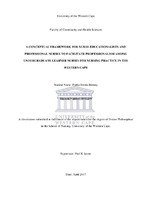A conceptual framework for nurse educationalists and professional nurses to facilitate professionalism among undergraduate learner nurses for nursing practice in the Western Cape
Abstract
Learner nurses are socialised into the professional nursing culture through a formal
undergraduate nursing programme, where the professional values of nursing are instilled in them
throughout their four-year training. During the four years, learner nurses are prepared by nurse
educationalists (nurse educators and clinical supervisors) and professional nurses to become
professional to render a quality nursing service. This is in spite of the pressures and challenges
related to the ever-changing socio-economic and political climate that influence the health
context within which these nurses practice. The researcher became aware of a growing number
of complaints from various stakeholders in the nursing profession in the Western Cape about the
unprofessional conduct of learner nurses. Nurse educators and professional nurses in practice
also complained that learner nurses had not developed professionalism by the end of their 4th
years of the nursing programme. Perceptions of nursing professionals were that graduate nurses
did not conduct themselves in a professional manner after they had completed the formal
undergraduate nurses training programme. From these problems, it became evident that a clear
framework for professionalism should be developed for nurse educationalists and professional
nurses to facilitate professionalism in undergraduate learner nurses for nursing practice in the
Western Cape. The purpose of this study was to develop a conceptual framework for nurse
educationalists and professional nurses with which they can facilitate professionalism in
undergraduate learner nurses of the nursing practice in the University of the Western Cape. The
study departed within the paradigm of the professionalism taxonomy of Brown and Ferrill (2009)
and Dickoff, James and Wiedenbach (1968).

